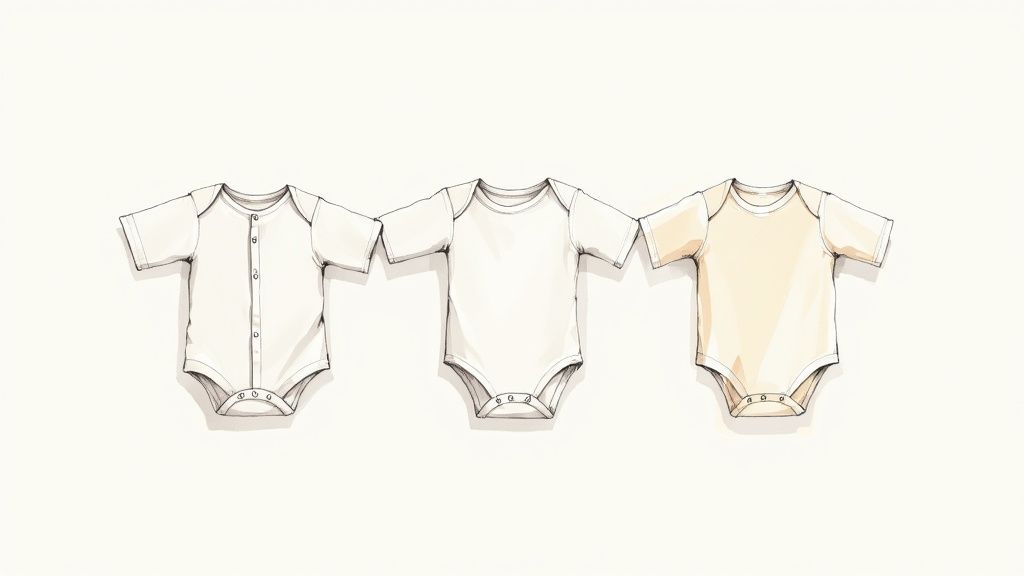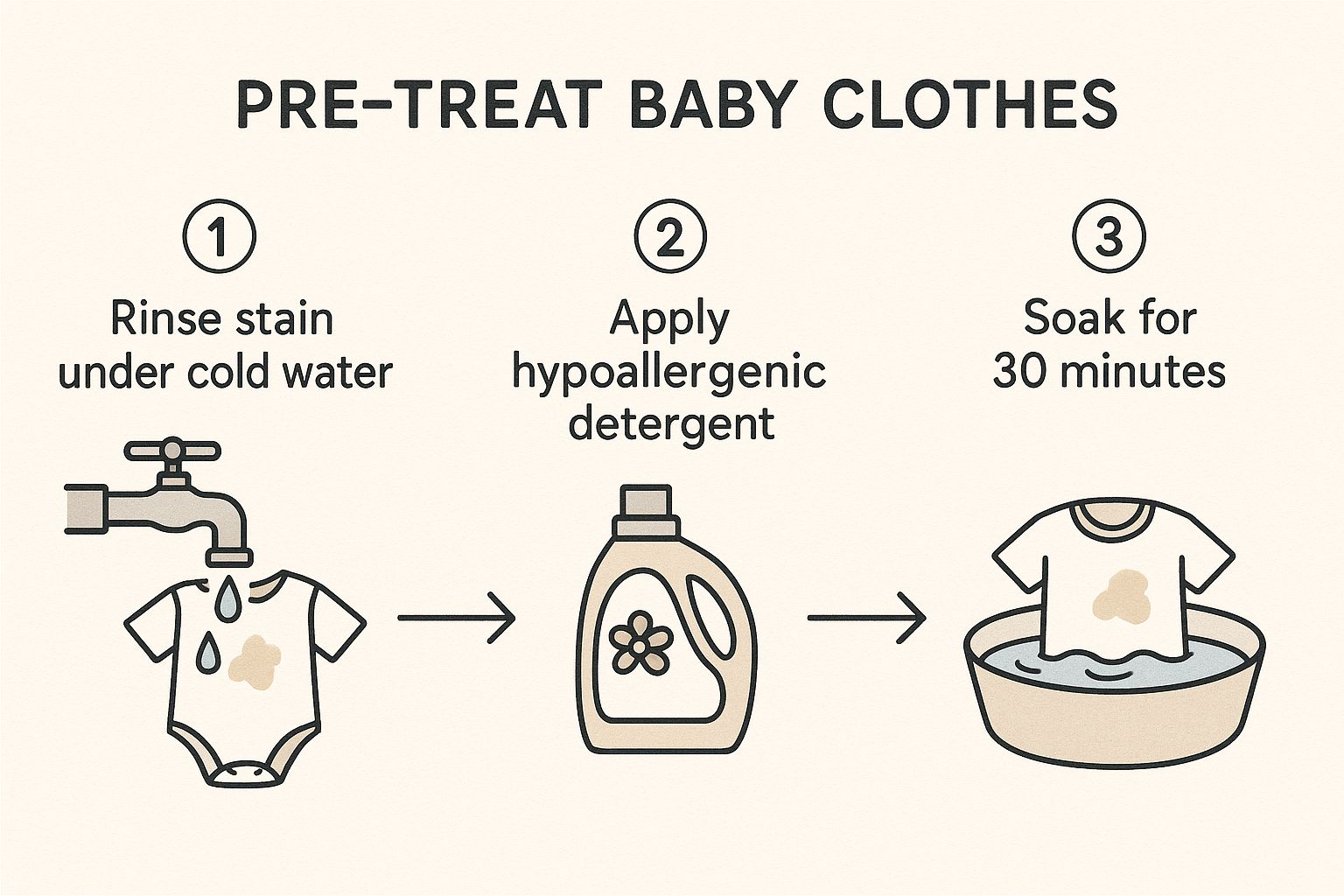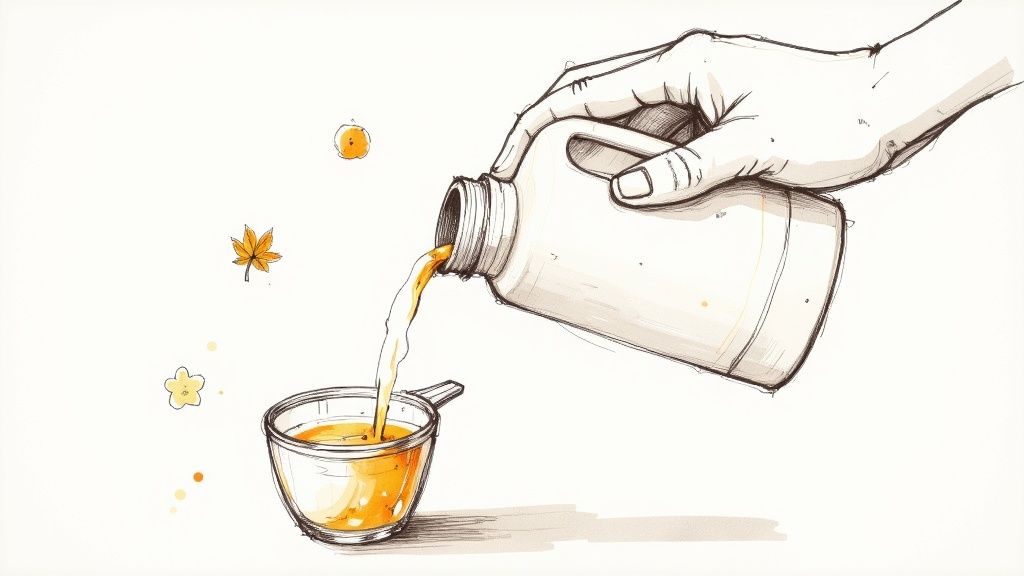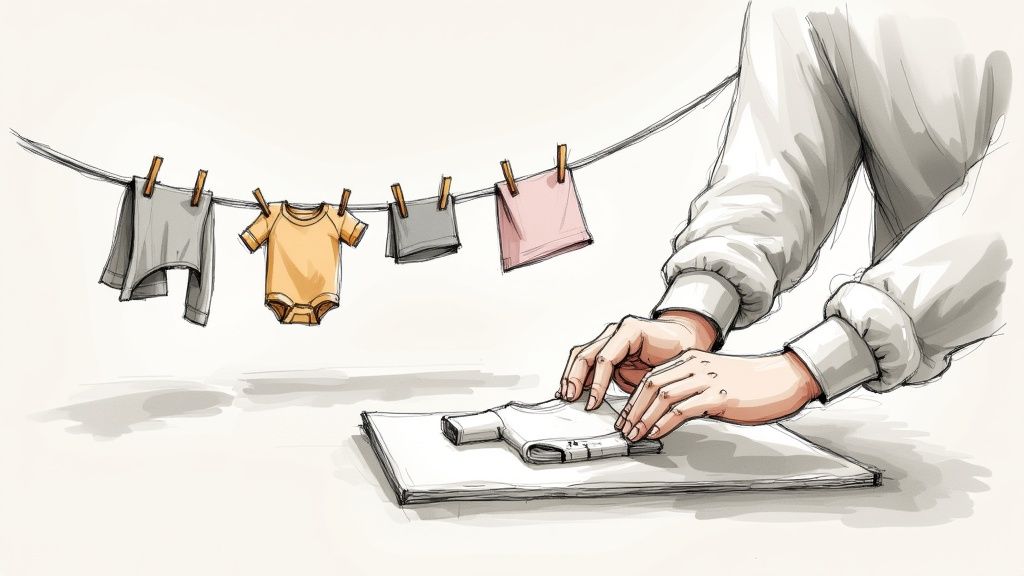Laver les vêtements de bébé est en réalité assez simple. Utilisez une lessive douce et non biologique , lavez les vêtements séparément sur un cycle délicat et réglez la température de l'eau à au moins 40 °C . Cette méthode simple permet de garder tout propre et hygiénique, surtout les grenouillères et débardeurs en coton, tout en protégeant la peau sensible de votre bébé.
Votre guide pour laver les vêtements de bébé
Bienvenue dans le monde des lessives pour bébé ! Cela peut paraître un peu compliqué au début, mais croyez-moi, prendre le coup de main pour laver les vêtements de bébé est bien plus simple qu'il n'y paraît. Ce guide a pour but de vous donner la confiance nécessaire dès le premier lavage, en vous concentrant sur les points essentiels pour l'entretien des vêtements en coton doux.
L'essentiel est de nettoyer parfaitement ces petits vêtements sans irriter la peau délicate de votre bébé. La plupart des vêtements que votre bébé portera (grenouillères, gilets, bavoirs, etc.) étant en coton doux, nous vous conseillerons d'en prendre soin.
Protéger la peau de votre bébé est la priorité numéro un
La peau d'un nouveau-né est incroyablement fine et poreuse comparée à la nôtre, ce qui signifie qu'elle est beaucoup plus susceptible de réagir aux produits chimiques agressifs contenus dans les lessives classiques. C'est pourquoi il est essentiel d'adopter une approche particulière pour le lavage, en particulier pour les vêtements en coton qui sont en contact direct avec la peau.
- Lavages séparés indispensables : lavez toujours les vêtements en coton de votre bébé séparément. Cela évite que les résidus de lessives et d'assouplissants pour adultes fortement parfumés ne se déposent sur ses petits vêtements.
- Les détergents doux font une réelle différence : choisir le bon détergent est probablement l’étape la plus critique pour éviter les problèmes de peau comme l’eczéma ou la dermatite de contact lors du lavage des articles en coton.
Cette approche douce est rapidement adoptée par la plupart des parents. En effet, des études montrent qu'environ 70 % des foyers britanniques avec des nourrissons privilégient les lessives spécifiquement étiquetées hypoallergéniques ou formulées pour les bébés. Vous pouvez en savoir plus sur ces choix parentaux et consulter les statistiques sur les produits pour bébés .
Pour vous aider à démarrer, voici un bref résumé des étapes clés.
Guide rapide pour laver les vêtements en coton pour bébé
| Action | Recommandation | Pourquoi c'est important pour votre bébé |
|---|---|---|
| Charges séparées | Lavez les vêtements de bébé séparément du reste du linge de la famille. | Empêche les résidus de détergent agressifs et les parfums forts d'irriter leur peau délicate. |
| Choisissez un détergent | Optez pour une lessive liquide non biologique , hypoallergénique et sans parfum. | Les détergents non biologiques sont exempts d’enzymes qui peuvent provoquer des réactions cutanées telles que des éruptions cutanées ou de l’eczéma sur les peaux sensibles. |
| Sélectionnez un cycle | Utilisez un cycle délicat ou doux sur votre machine à laver. | Protège les fibres douces du coton, empêchant l'étirement et gardant les vêtements confortables plus longtemps. |
| Régler la température | Lavez à 40°C voire 60°C pour les articles très sales comme les bavoirs en coton ou les couches lavables. | Assure que les germes et les bactéries sont efficacement éliminés, gardant tout hygiénique et sûr. |
| Séchage | Séchez à l'air libre si possible ou utilisez un sèche-linge à basse température. | La lumière du soleil est un désinfectant naturel et la faible chaleur empêche le rétrécissement, préservant ainsi la coupe des vêtements en coton. |
Adopter ces principes de base dès le départ vous permettra d'adopter une routine de lessive sûre et efficace. En utilisant des lessives douces, des températures d'eau adaptées et en comprenant comment entretenir le coton, vous garantirez à votre enfant un vêtement non seulement propre, mais aussi parfaitement doux et confortable. Cette approche soignée contribue également à prolonger la durée de vie des vêtements en coton, ce qui est un véritable atout.
Choisir la meilleure lessive pour votre bébé

Entrer dans le rayon lessive peut sembler un peu fastidieux, surtout avec un nouveau-né à la maison. Mais choisir la bonne lessive pour ses vêtements en coton est en réalité assez simple une fois que l'on sait quoi chercher. Ma règle d'or, et celle que vous entendrez de la plupart des pédiatres, est de privilégier une lessive liquide non biologique , hypoallergénique et sans parfum .
Vous avez probablement déjà vu la mention « non bio » sur les bouteilles et vous êtes demandé ce que cela signifiait. En fait, ces lessives ne contiennent pas les puissantes enzymes nettoyantes utilisées dans les formules « bio ». Si ces enzymes sont efficaces pour éliminer les taches tenaces sur nos vêtements, elles peuvent être un peu agressives pour la barrière cutanée en développement de bébé. Elles laissent parfois des résidus sur les tissus en coton, ce qui peut provoquer irritations et éruptions cutanées.
De même, les mentions « hypoallergénique » et « sans parfum » sont vos meilleures alliées. Ces labels signifient que le produit a été conçu pour minimiser les risques de réactions allergiques, en excluant les ingrédients courants comme les parfums et les colorants, souvent responsables de sensibilité cutanée.
Décryptage des étiquettes et des additifs des détergents
Prendre l'habitude de lire la liste des ingrédients au dos du flacon change la donne. Les formules simples sont presque toujours plus efficaces pour laver le coton de bébé. Méfiez-vous des longues listes de noms chimiques complexes. Ce n'est pas pour rien que les parents optent de plus en plus pour des options sans enzymes et sans parfum : la sécurité et le confort de bébé sont notre priorité.
Un conseil que je donne toujours aux jeunes parents : évitez complètement l'adoucissant. Ces produits enrobent les fibres de produits chimiques pour les rendre douces au toucher, mais ces mêmes produits peuvent facilement irriter la peau délicate de votre enfant, surtout sur les vêtements comme les pyjamas en coton qu'il porte toute la nuit.
Lorsque vous lavez les vêtements de votre bébé, l'objectif est un nettoyage doux mais efficace. Il peut également être utile de considérer l'environnement global de votre maison. Comprendre les principes généraux du nettoyage écologique peut vous aider à créer un espace plus sûr et non toxique pour toute votre famille.
En fin de compte, une lessive simple et douce est souvent le choix le plus doux pour la peau de votre bébé et pour les tissus en coton délicats. Cette approche s'inscrit parfaitement dans notre philosophie de création de vêtements pour enfants durables .
Bon, vous avez choisi une lessive douce. Passons maintenant au cœur du problème : s'attaquer à cette pile toujours croissante de minuscules pyjamas et débardeurs en coton.
Adopter une routine de lessive simple et fiable est la meilleure solution pour maîtriser la lessive de bébé. Il ne s'agit pas de compliquer les choses, mais de simples gestes réguliers peuvent faire toute la différence pour que ces vêtements en coton restent doux et sans danger pour la peau de votre tout-petit.
Tout d'abord, les taches. Les régurgitations, les éruptions cutanées et les éclaboussures des premiers repas font partie du lot. Le mieux est d'agir vite. Dès qu'un incident survient, rincez la zone tachée à l'eau froide. Cette astuce simple empêche la tache de s'incruster profondément dans les fibres délicates du coton.
Éliminer les taches avant le lavage
Pour les taches plus tenaces, un léger prétraitement avant le lavage principal peut faire toute la différence. Pas besoin de détachants agressifs. Appliquez simplement une petite quantité de lessive non bio et adaptée aux bébés de votre choix directement sur la tache du tissu en coton.
Cette image décompose une méthode de prétraitement simple et efficace pour les vêtements de bébé.

Comme vous pouvez le constater, un rinçage rapide, une touche de lessive douce et un bref trempage suffisent généralement. C'est une méthode fantastique et non toxique pour éliminer la plupart des taches de bébé courantes sans agresser le coton.
Dans la machine à laver
Au moment de la lessive, je recommande toujours de mettre les vêtements de bébé dans une machine séparée. Cela évite que les restes de lessive ou les saletés de vos vêtements ne se déposent sur les siens.
Bien sûr, la machine elle-même joue un rôle essentiel. Si vous êtes à la recherche d'une nouvelle machine, il est judicieux de bien vous renseigner et de choisir la machine à laver la mieux adaptée aux besoins de votre famille .
Un cycle délicat est idéal pour protéger le coton. La bonne température est également essentielle pour une propreté hygiénique.
Les recommandations du NHS pour le lavage des vêtements de bébé préconisent un lavage à température plus élevée pour des raisons d'hygiène. C'est une pratique que de nombreux parents suivent : des études montrent que 65 % des parents britanniques lavent systématiquement les vêtements de bébé à 40 °C ou plus pour garantir une désinfection optimale.
Sécher correctement
Une fois le cycle terminé, la façon dont vous séchez les vêtements est tout aussi importante, en particulier pour le coton.
Le séchage sur fil à l'extérieur est idéal si vous le pouvez. La lumière du soleil est un désinfectant naturel et laisse aux vêtements en coton un parfum d'air frais incomparable. Si vous devez utiliser un sèche-linge, optez pour une température basse . Cela empêchera le coton de rétrécir et gardera vos petits pyjamas parfaitement doux et confortables.
Erreurs courantes de lessive commises par les nouveaux parents

Nous sommes tous passés par là. Chaque jeune parent apprend au fur et à mesure, mais en matière de lessive, un peu de savoir-faire peut vous éviter certains pièges classiques. Adopter une routine de lessive réussie pour bébé implique souvent de se défaire de quelques vieilles habitudes, surtout lorsqu'il s'agit d'une peau délicate et d'une multitude de vêtements en coton doux.
Un problème récurrent est l'utilisation d'une quantité excessive de lessive. On pense souvent qu'une plus grande quantité de lessive est synonyme d'un meilleur nettoyage, mais pour les vêtements de bébé, c'est généralement l'inverse. Tout excès de lessive qui ne se rince pas complètement laisse des résidus sur les tissus en coton, ce qui est souvent la cause d'irritations cutanées. Respectez le dosage indiqué sur votre flacon de lessive douce ; il est là pour une bonne raison.
Une autre erreur fréquente ? Surcharger la machine à laver. Je comprends, on veut laver cette montagne de petits vêtements au plus vite. Le problème, c'est que surcharger la machine empêche les vêtements de bouger librement. S'il n'y a pas assez d'espace pour que l'eau et la lessive puissent circuler, les pyjamas et débardeurs en coton ne ressortiront tout simplement pas propres.
Le piège des assouplissants
Parlons maintenant de la plus grosse erreur : utiliser de l'assouplissant ou des feuilles assouplissantes parfumées. Ces produits enrobent les fibres du tissu d'une couche de produits chimiques et de parfums pour les rendre douces.
Bien que ces additifs puissent rendre vos vêtements plus confortables, ils sont connus pour provoquer des irritations cutanées chez les bébés. Ils peuvent également réduire le pouvoir absorbant naturel du coton, ce qui est à éviter pour des articles comme les bavoirs et les couches.
Au lieu d'adoucissant, voici une astuce simple que je recommande pour préserver la douceur du coton : ajoutez environ 120 ml (une petite tasse) de vinaigre blanc au cycle de rinçage. C'est un excellent adoucissant naturel qui élimine les résidus de savon, sans laisser la moindre trace d'odeur ni de produits chimiques nocifs.
En évitant ces erreurs courantes, vous adopterez une routine sûre et efficace pour laver les vêtements de votre bébé, garantissant que chaque vêtement en coton reste doux et délicat pour sa peau.
Comment garder les vêtements en coton de bébé doux et durables
Le coton est le roi des tissus pour bébés, et ce n'est pas pour rien : il est respirant, doux pour les peaux sensibles et incroyablement confortable. Mais après quelques lavages, ces grenouillères merveilleusement douces peuvent parfois devenir un peu raides et perdre de leur charme. Le secret pour les garder douces n'est pas compliqué ; il suffit d'adopter quelques bonnes habitudes de lessive.
La chaleur est l'un des principaux responsables du rétrécissement et de la raideur du coton. Si un lavage à 40 °C est parfaitement adapté pour un nettoyage optimal, il est conseillé d'éviter à tout prix le séchage à haute température. La chaleur intense du sèche-linge peut provoquer le rétrécissement et le durcissement des fibres délicates du coton, laissant les vêtements rugueux et déformés. Dans la mesure du possible, le séchage à l'air libre est votre meilleur allié.
Techniques simples pour l'entretien des tissus
Ce sont souvent les petits détails de votre routine de lessive qui font toute la différence dans la durée de vie des vêtements en coton de votre bébé. Ces petits ajustements contribuent grandement à protéger le tissu et les jolis détails des vêtements.
- Retournez les vêtements : Pour tous les vêtements en coton ornés d'imprimés, de broderies ou d'appliqués, retournez-les toujours avant de les mettre en machine. Ce simple geste permet d'éviter que les motifs ne s'estompent, ne se fissurent ou ne s'écaillent, et de conserver ainsi leur aspect neuf.
- Utilisez un filet à linge : les petits articles en coton comme les chaussettes, les mitaines et les bavoirs ont la capacité magique de disparaître au lavage. Les mettre dans un filet à linge permet non seulement de les garder ensemble, mais aussi d'éviter qu'ils ne s'accrochent ou ne s'étirent.
Voici une petite astuce que je recommande absolument : le vinaigre blanc. Ajoutez-en environ 120 ml au cycle de rinçage de votre machine pour qu'il agisse comme un adoucissant naturel. Il est excellent pour éliminer les résidus de lessive, souvent responsables de la rigidité des tissus en coton. Il laisse le coton incroyablement doux sans aucun produit chimique agressif – et, promis, vos vêtements ne sentiront plus la friterie !
Bien sûr, investir dès le départ dans des vêtements en coton de haute qualité et durables fait toute la différence. C'est l'un des principes fondamentaux du mouvement slow fashion, que vous pouvez découvrir dans notre guide pour comprendre la fast fashion et son impact. En combinant un shopping responsable à ces techniques de lavage douces, vous garantissez que chaque petite tenue reste douce et confortable sur la peau de votre bébé, lavage après lavage.
Réponses à vos questions sur le lavage des vêtements de bébé

Quand on regarde cette première pile de petits vêtements, beaucoup de questions peuvent surgir. C'est tout à fait normal ! Passons en revue certaines des questions les plus fréquentes que me posent les jeunes parents, pour que vous puissiez faire la lessive en toute confiance, surtout pour les essentiels en coton.
Dois-je vraiment laver les nouveaux vêtements de bébé avant de les utiliser ?
Oui, absolument. C'est une étape que je recommande toujours aux parents de ne jamais négliger. Il est tentant d'enfiler immédiatement cette adorable grenouillère en coton neuve, mais les vêtements neufs, même en coton doux, contiennent souvent des résidus de produits chimiques provenant de l'usine. Ils ont également été manipulés par de nombreuses personnes et ont accumulé poussière et germes pendant le transport et en magasin.
Un lavage rapide et doux élimine tous ces irritants potentiels. Il garantit que le premier contact avec la peau toute neuve de votre bébé sera parfaitement propre et doux.
À quelle fréquence dois-je laver les vêtements et la literie de mon bébé ?
Vous prendrez un certain rythme, mais un bon point de départ est de laver tout ce qui est en contact direct avec la peau après une seule utilisation. Pensez aux débardeurs en coton, aux pyjamas et aux chaussettes. Des couches extérieures comme un petit cardigan ou un pull douillet peuvent souvent leur permettre de se porter à nouveau, à condition qu'ils soient encore propres.
Quant à la literie, comme les draps en coton et les gigoteuses, je recommande de les laver tous les un ou deux jours . Bien sûr, en cas de régurgitations ou de fuites, mettez-les directement à la machine pour que le couchage de votre bébé reste hygiénique et confortable.
Une bonne règle de base est de tenir compte de la proximité du vêtement avec la peau de votre bébé. Plus il reste longtemps près de la peau, plus il doit être lavé souvent. Ce simple état d'esprit peut vous aider à gérer la pile de linge sans qu'elle ne vous envahisse !
Puis-je utiliser un détachant ordinaire sur les vêtements de bébé ?
Je serais très prudente ici. Les détachants classiques contiennent des produits chimiques puissants, des enzymes et des parfums trop agressifs pour la peau en développement d'un bébé. Des résidus peuvent facilement se loger dans les fibres de coton et provoquer de vilaines irritations ou des éruptions cutanées.
Le mieux est de trouver un détachant spécialement conçu pour les vêtements de bébé. Vous pouvez aussi essayer une solution douce et maison. Une simple pâte préparée avec votre lessive non bio et un peu d'eau peut faire des merveilles sur le coton. Tamponner une tache avec du vinaigre blanc dilué avant le lavage est une autre astuce efficace pour les taches courantes liées aux bébés.
Est-il sécuritaire de laver les vêtements de bébé avec le linge de la famille ?
C'est une question très fréquente. Bien que cela soit techniquement possible si vous utilisez déjà une lessive douce et non biologique pour le linge de tout le monde, je recommande toujours de laver les vêtements en coton de bébé séparément pendant au moins les six premiers mois .
Les laver seuls est une simple précaution. Cela empêche la saleté tenace, les germes et les résidus tenaces des vêtements pour adultes et des détergents puissants de se transférer sur les affaires de votre bébé. C'est un moyen simple de créer une petite bulle protectrice pour son organisme fragile.
Chez Little Novice , nous comprenons l'importance d'un départ en douceur. Notre collection de vêtements unisexes et intemporels est confectionnée en coton naturel et respirant, conçu pour être aussi respectueux de la peau de votre bébé que de la planète. Découvrez nos essentiels durables sur https://littlenovice.co.uk .